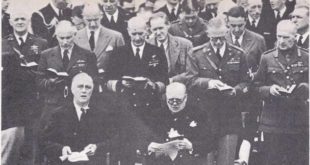In 1871 there occurred one of the strangest meetings in history. The place was Ujiji on Lake Tanganyika in the heart of Africa. The men who met were David Livingstone, a Scottish missionary who was also a doctor, and Henry M. Stanley, a newspaperman. Livingstone had come to Africa about thirty years before. Anxious to spread Christianity and civilization among the Africans, in this unknown and mysterious continent, he had undertaken long trips into the interior. For several years, however, Livingstone had not been heard from, so the New York Herald sent Stanley, a roving reporter, to look for him. …
Read More »Tag Archives: Suez Canal
The United Nations and the End of Colonialism 1946 -1965
Even before the Korean War, the United Nations had proved that it could take effective action to control serious conflicts. It first took such action in the conflict over Palestine. During World War I, the British had ousted the Turks from Palestine. When the war was over, the League of Nations placed that land under the authority of Britain. The British then issued the famous Balfour Declaration, which promised the Jewish people that Palestine would someday become their homeland, but the Arabs of Palestine and the surrounding countries strongly objected to this and year after year passed without the British …
Read More »A World at War 1939 – 1941
Now the people of Europe began to hear a new sound, a sound that would haunt them throughout the years of war — the wail and shriek of air-raid sirens. At night, the lights of Europe went out and the “blackout” made familiar streets strange places of darkness. Street lamps were left unlit and windows were covered with heavy draperies. Any stray gleam of light might help guide enemy bombers to their targets. Hurrying about their wartime duties, the people of Britain and France began to wonder. They had not wanted war and yet war had come. Why? What had …
Read More »Victory in Europe 1941 – 1945
Even before Pearl Harbour, there had been cooperation between the United States and Britain. In August of 1941, President Roosevelt and Prime Minister Churchill met secretly, on a cruiser at sea off the coast of Newfoundland. There they drew up the Atlantic Charter, a document stating the principles on which they based their hopes for a better future for the world. They pledged that neither country would seek more territory. They hoped that, “after the final destruction of Nazi tyranny,” all men in all lands could “live out their lives in freedom from want and fear,” and they called on …
Read More »The United States and Destiny 1848-1914
THE UNITED STATES entered the race for colonies last of all the powers, at the end of the nineteenth century. Long before then, however, Americans were accustomed to taking over territory; they had, in fact, built their country westward from the Atlantic by settling lands they had bought or seized. In the Mexican War of 1845-48 they had taken a huge tract of land from Mexico by force. Many Americans, including Abraham Lincoln believed that the Mexican War was simply an invasion of a weak country by its powerful, land hungry neighbour. Others maintained that the move was justified by …
Read More »Rivalries in the Middle East 1856 – 1912
THE MIDDLE EAST where Europe, Asia and Africa meet had long been known as one of the great crossroads of the world. Most of its people were Moslems, but among them were many Christians and Jews. They spoke languages as different as Arabic and Latin, Slavic and Turkish. They had little in common except that they were all subjects of the Ottoman sultan in Constantinople. The Ottoman Empire — so called after its early founder, Othman — was the last of several empires to rule over a large part of Islam. Unlike the earlier empires, it was dominated not by …
Read More »India and the Indies 1856 – 1914
In 1856, Great Britain was at war with Russia in the Black Sea area and with the Chinese emperor in south China. Many British troops had been withdrawn from India to fight on these battlefronts. As a result, nine-tenths of the 200,000-man army guarding Great Britain’s largest and richest possession, the subcontinent of India in south-central Asia, consisted of native soldiers called sepoys. At the time, the British were putting a new type of rifle into service in the Indian Army. To load it, a rifleman had to insert each cartridge separately and the cartridges were covered with grease. In …
Read More »Stepping-Stones for the West, 1869
ON NOVEMBER 16, 1869, the sun rose over the eastern end of the Mediterranean Sea and shone on the blue water. The squat buildings of Port Said, on the shore of Egypt, glowed against the clear sky. A new town, Port Said had begun to rise only ten years before from the barren plain that joins Africa to Asia. In the man-made harbour were crowded eighty ships. Some were warships, others merchantmen, but all were strung with brightly-coloured pennants. On board were distinguished visitors, among them the emperor of Austria-Hungary, the crown prince of Prussia, the prince of Holland and …
Read More »






